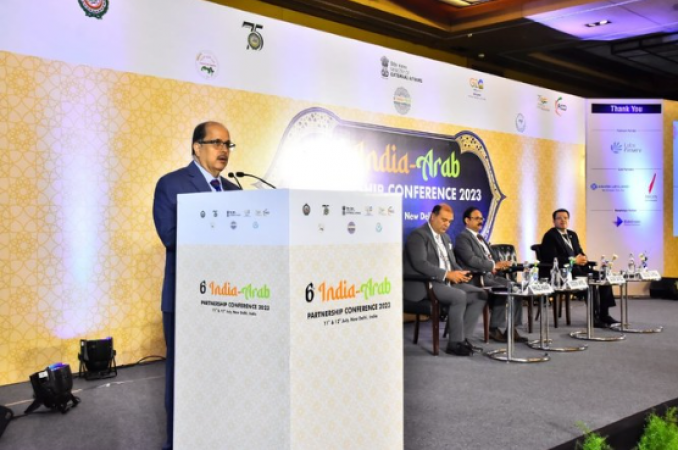
New Dellhi: At the India-Arab Partnership Conference in New Delhi on Wednesday, officials and representatives of leading business organisations stated that India and Arab states expect to increase their cooperation in the areas of green energy, technology, health care, and food security.
In collaboration with the Indian Ministry of External Affairs and the League of Arab States, a cooperation alliance of 22 Arab nations, including Saudi Arabia, Egypt, Kuwait, and the United Arab Emirates, the Federation of Indian Chambers of Commerce and Industry organised the two-day conference on July 11 and 12.
In his closing remarks, Dr. Ausaf Sayeed, secretary of the Indian Ministry of External Affairs, said, "India not only has very strong political relations with each member state of the League of Arab States, but our trade and economic relations with these countries are also blossoming into very dynamic and mutually beneficial partnerships."
Also Read: President Biden: The US will be able to sell F-16s to Turkey
The free trade agreement negotiations between India and the GCC have resumed. The delegations have been meeting and exchanging draught documents. We are hopeful that this will happen quickly and open up new business opportunities for both parties.
After two unsuccessful rounds in 2006 and 2008, this is the third time that the two parties have attempted to reach a trade agreement. The GCC secretary-general and the trade minister of India both announced plans to pick up negotiations in November of last year.
Government representatives from both India and Arab nations, as well as representatives of important Indian and Middle Eastern trade organisations and businesses, attended the India-Arab Partnership Conference.
As he expressed hope for the future of the Indo-Arab partnership, Dr. Khalid Hanafi, secretary-general of the Union of Arab Chambers, thanked the governments and business community on both sides.
He asserted that the relationship between India and the Arab world has a promising future.
The traditional, linear nature of our relationship should now give way to a new, technologically-based relationship.
The conference has given the business communities on both sides a useful forum for interaction, understanding unrealized potential in a variety of fields, and exploring new opportunities for trade and investment.
Energy security, renewable energy, technology, food security, health care, chips and semiconductors, and supply chains were among his list of cooperation's priority areas.
Given that the Gulf countries supply almost 35 percent of India's oil imports and 70 percent of its gas imports, energy cooperation is particularly crucial.
Energy trade between India and many of these nations has developed into more than just a buyer-seller arrangement, according to Sayeed.
"Renewable energy, particularly in the areas of green hydrogen and green ammonia, is another significant area of our bilateral cooperation with West Asia. This gains significance as the world witnesses the serious effects of climate change and time is running out, underscoring the necessity of acting quickly.
Arab nations are India's largest trading partners in terms of trade and commerce; during the fiscal year 2022–2023, trade with members of the Arab League states exceeded $240 billion.
India conducts the majority of its business with nations in the Gulf Cooperation Council, particularly the UAE, with which New Delhi signed a free trade agreement last year.
Trade alone with the GCC nations reached over $184 billion. According to Sayeed, Saudi Arabia will overtake the UAE as India's fourth-largest trading partner in 2022-2023 with a $42.9 billion trade surplus. New Delhi is currently negotiating a trade agreement with the entire GCC.
Also Read: Humans have Found the World's Eighth Wonder in the Fractures of Mountains
The free trade agreement negotiations between India and the GCC have resumed. The delegations have been meeting and exchanging draught documents. We are hopeful that this will happen quickly and open up new business opportunities for both parties.
After two unsuccessful rounds in 2006 and 2008, this is the third time that the two parties have attempted to reach a trade agreement. The GCC secretary-general and the trade minister of India both announced plans to pick up negotiations in November of last year.
Government representatives from both India and Arab nations, as well as representatives of important Indian and Middle Eastern trade organisations and businesses, attended the India-Arab Partnership Conference.